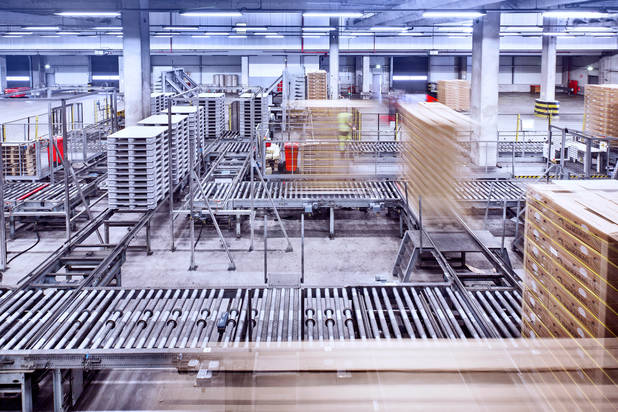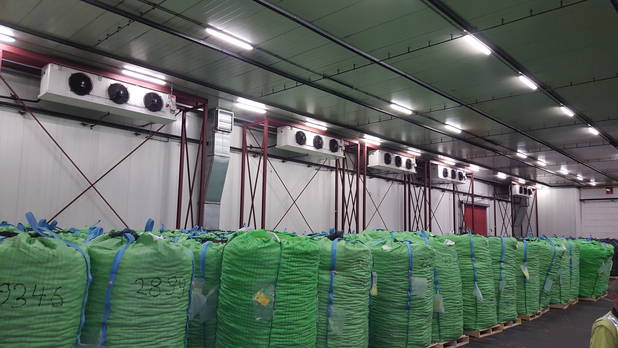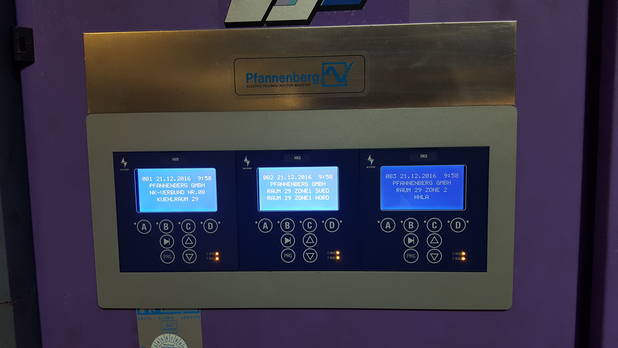HHLA - Served on ice – modernization of the refrigeration systems at the Hamburg fruit port
The HHLA Frucht- und Kühl-Zentrum GmbH has more than 18 refrigerated areas with a total capacity for just under 13,000 pallets.
Over 500,000 tonnes of tropical fruit are handled at O'Swaldkai at the fruit port in Hamburg, making it the largest of its kind in Germany. Ensuring that end consumers receive bananas and kiwis (to name but two varieties) that have been kept fresh and cool makes particular demands of the refrigeration systems: they should run without any problems, consume little energy and also be easy to maintain. To achieve this, Pfannenberg developed a concept that provides for full modernization of the refrigeration systems, some of which were installed in the 1970s, by 2020.

Hamburger Hafen und Logistik AG (HHLA) manages a fruit and refrigeration center that covers over 166,000 square meters. Shed 46 alone contains 6 modular systems with a refrigeration capacity of more than 2 megawatts, which cools approximately 60,000 cubic meters down to -2 degrees Celsius.
A centralized system controls the refrigeration, heating and ventilation processes in a total of 14 refrigerated areas offering different storage conditions at different temperatures. One of the challenges was to integrate a new system to control the whole chilling process in the central control system. Pfannenberg focused the modernization concept mainly on operational safety, efficiency and economy. This involved repairing the piping and cabling of the existing system and replacing the refrigerant with a new one which is complying with new legal requirements.
The first stage was to modify system 8 in Shed 46.

The modernization has resulted in an improvement to operating safety and energy efficiency. Immediately after putting the system into operation, we were saving 50% on energy and the oil problem had been dealt with. The proficient service we have received from Pfannenberg has helped us to meet our objective fully.
Change to new refrigerant
Partly built in the 1970s, the refrigeration system was originally designed to use R22 refrigerant which was then banned and replaced by the drop-in refrigerant R422D. In accordance with the new EU directive 517/2014 (F-gas directive 2014), the system now contains the modern refrigerant XP40. In order to optimize the performance of the system, Pfannenberg installed three new main modules, 26 controllers and 10 electronic injection valves and laid five kilometers of new cable. The system can now achieve a 600 kW cooling capacity.
A serious problem with the oil solved
Despite a good piping network, serious problems with the oil occurred frequently in the multicompressor refrigeration system. To avoid damaging the compressor, it was necessary to refill with oil at regular intervals and readjust the setting screws. The modernization is intended to solve this this serious problem completely in the long term. To achieve this, Pfannenberg installed new equipment in the form of four fully automatic oil level regulators, two hot-gas/liquid separators and an oil tank. The pipe diameters in the assembly were changed to 76 mm and the pipe cross-sections were readjusted. When operations recommenced, the system was working as required. After 50 operating hours, it had already discharged more than 100 liters of excess oil.
Automatic exchange of data allows remote maintenance
An important part of the modernization is the remote transmission of data which makes it easier to maintain the system. With updated measurement, adjustment and control equipment, the refrigerated units can communicate with each other and transmit the data to the multicompressor refrigeration system which uses it to calculate the optimum suction pressure in order to slow the timing of the compressors and improve performance as a result. The modular cooling system can be monitored remotely together with an HACCP 24-hour monitoring system in compliance with veterinary inspection office regulations. It is now no longer necessary to carry out daily inspections of the machine room as the status of the machines can always be monitored from anywhere using the remote maintenance system.

Modernized in only four weeks
The modernized system has been in operation at O’Swaldkai since January 2017. Project planning, including coordination of various subcontractors, was very time-consuming. Nevertheless, a strict schedule was adhered to and the modular refrigeration system was modernized in just four weeks. It is planned to have updated four of the eight modular systems by 2020. With the efficiencies thus achieved, it will be possible to take the other three systems, with almost a tonne of refrigerant and a cooling capacity of 656,000 watts, out of operation without affecting performance overall. This not only saves on operational and repair costs, but also means less maintenance work. The modernization will allow up to 12 leak tests fewer to be made every year.
Objective achieved
Automation makes it possible: HHLA now operates a modernized modular refrigeration system which is not permanently working at its limits but which is running efficiently with coordinated parameters. This is an important objective of the modernization which has already been achieved.
“The modernization has resulted in an improvement to operating safety and energy efficiency,” says Martin Bartsch, Head of Operating Technology at HHLA. “Immediately after putting the system into operation, we were saving 50% on energy and the oil problem had been dealt with. The proficient service we have received from Pfannenberg has helped us to meet our objective fully.”
Detailed project planning and coordination of each individual task presented a considerable challenge in updating a modular refrigeration system of this size. With their many years of experience and core expertise in thermal management, Pfannenberg was able to automate the refrigeration systems in the Hamburg fruit port in just four weeks.
| Описание | язык | Тип | Размер | Загрузить |
|---|---|---|---|---|
Case Study "HHLA"Modernization of the refrigeration systems at the Hamburg fruit port |
|
230 KB | Загрузить |
